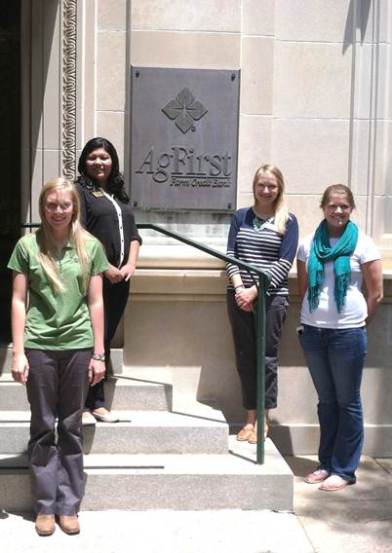Archive
Farm Credit Harvest Festival Raises Nearly $3,000 to Help End Hunger
By Christina Bowen
 More than 56,000 kids across South Georgia may go to bed hungry tonight and one in three children in that area live in homes where having enough to eat is a daily struggle. Farm Credit is dedicated to making a difference in the communities we serve and is proud to announce that the inaugural Farm Credit Harvest Festival at the Sunbelt Ag Expo raised nearly $3,000 to support Second Harvest of South Georgia and its programs to end hunger in the area.“We are grateful to have partners in the fight against hunger like Farm Credit. Through their efforts, we will be able to provide nearly $24,000 in food assistance services to those in need in South Georgia,” said Eliza McCall, chief marketing officer of Second Harvest of South Georgia. “Hunger in Georgia is an enormous problem, but with help and support from people like the good folks at Farm Credit, we are making strides to end hunger every day.”
More than 56,000 kids across South Georgia may go to bed hungry tonight and one in three children in that area live in homes where having enough to eat is a daily struggle. Farm Credit is dedicated to making a difference in the communities we serve and is proud to announce that the inaugural Farm Credit Harvest Festival at the Sunbelt Ag Expo raised nearly $3,000 to support Second Harvest of South Georgia and its programs to end hunger in the area.“We are grateful to have partners in the fight against hunger like Farm Credit. Through their efforts, we will be able to provide nearly $24,000 in food assistance services to those in need in South Georgia,” said Eliza McCall, chief marketing officer of Second Harvest of South Georgia. “Hunger in Georgia is an enormous problem, but with help and support from people like the good folks at Farm Credit, we are making strides to end hunger every day.”
Thousands of people stopped by to show their support for local foods and farms, and helped in the fight against hunger in South Georgia at the inaugural Harvest Festival, which featured live bluegrass music from Blue Holler, daily silent auctions, peach pie eating contests with pies from the Corner Cakery, cornhole and more. Check out our Facebook album for photos of the event.
Farm Credit would like to thank Second Harvest of South Georgia and the generous donors whose support made the Local Foods Gift Basket Auctions possible, including:
6 chosen as 2013-14 National FFA officers ends 86th National FFA Convention & Expo
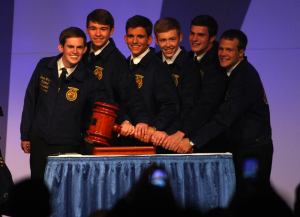
LOUISVILLE, Ky. (Saturday, Nov. 2, 2013/National FFA Organization) – Students from Virginia, Tennessee, Alabama, Iowa, West Virginia and Oregon have been elected by delegates from throughout the U.S. to serve on the 2013-14 National FFA Officer team.
Brian Walsh of Virginia, an agribusiness major at Virginia Tech, was elected president. Mitch Baker of Tennessee, an agricultural communications major at University of Tennessee, will serve as secretary.
Steven Brockshus of Iowa, an agricultural education and global resource systems major at Iowa State University, was elected Central Region vice president and Jackson Harris of Alabama, a community development major at the University of Alabama, will serve as Southern Region vice president.
Wes Davis of West Virginia, an agribusiness management and rural development major at West Virginia University, was elected Eastern Region vice president and Jason Wetzler of Oregon, an agricultural leadership major at Oklahoma State University, will serve as Western Region vice president.
Each year at the National FFA Convention & Expo, six students are elected by delegates to represent the organization as National FFA officers. Delegates elect a president, secretary and vice presidents representing the central, southern, eastern and western regions of the country.
National officers commit to a year of service to the National FFA Organization. Each travels more than 100,000 national and international miles to interact with business and industry leaders, thousands of FFA members and teachers, corporate sponsors, government and education officials, state FFA leaders, the general public and more. The team will lead personal growth and leadership training seminars for FFA members throughout the country and help set policies that will guide the future of FFA and promote agricultural literacy.
“For this new national officer team, it will be a year of hard work, long hours, lots of travel and major advocacy for FFA and agricultural education,” said 2012-13 National FFA President Clay Sapp, who delivered his retiring address today before the new team was named. “It is a year of profound experiences that will change their lives and thousands of lives their service will touch.”
The National FFA Organization provides leadership, personal growth and career success training through agricultural education to 579,678 student members in grades seven through 12 who belong to one of 7,570 local FFA chapters throughout the U.S., Puerto Rico and the Virgin Islands.
FARM TO PLATE: HALLOWEEN TREATS
Starting at dusk tomorrow, 41.1 million children across the U.S. will dress up in costumes and knock on their neighbors’ doors asking for treats. Whether you find Cinderella or Superman at your door, you’re likely to be handing over some candy – 74 percent of us are planning to support the seasonal sweet craving this year, doling out chocolate, candy corn and other confections to the ghouls and goblins on our doorsteps.
The main ingredient in all this Halloween candy is sugar, a product that comes from two different groups of U.S. farmers: sugar beet growers in the north and sugar cane growers in the south.
Richard Benzel and his brothers produce 18,000 tons of sugar beets a year on their third generation Montana farm, a crop that yields just over 3,000 tons of sugar. Much of a sugar beet is water, and once the sugar has been removed and the water pressed out, the remaining plant material is used as cattle feed.
Down in Louisiana, Charles Landry and his brothers also work together on their family operation to raise 2,400 acres of sugar cane. Their hundred-day harvest season is filled with long days as they work with their employees to cut and gather the cane before the first frost and deliver it fresh to the sugar mill.
Sugar cane harvesting is time sensitive because the cane needs to be processed within 24 hours of harvest, so growers work in close coordination with sugar mills like the Louisiana Sugar Cane Cooperative. LaSuCa carefully schedules deliveries from all of its grower-members so that each delivers freshly harvested cane every day, giving each an equal opportunity to provide optimal, sugar-rich cane.
Though the crops are different, the sugar from sugar beets and sugar cane is the same, and together these two groups of farmers produce 8.1 million tons of sugar a year.
This Halloween, whether you’re reaching into the bowl of leftovers or diving into your child’s haul – a practice admitted by 81 percent of parents – take a moment to appreciate the hard work and dedication of our sugar beet and sugar cane farmers.
– See more at: http://www.farmcreditnetwork.com/newsroom/blog/article/farm-to-plate-halloween-treats#sthash.QNu25qbD.dpuf
Commissioner of Agriculture and Consumer Services, Matt Lohr accepts position with Farm Credit of the Virginias
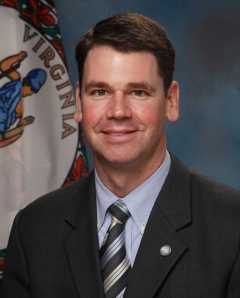 Farm Credit of the Virginias, headquartered in Staunton, Virginia announced today that Virginia Commissioner of Agriculture and Consumer Services, Matt Lohr will be joining the organization on December 16, 2013 to work with Kyley Clevenger to develop the Farm Credit Knowledge Center. CEO, Dave Lawrence shared, “ The FCV team welcomes Matt and believes he will increase the value the Knowledge Center provides to all of our customers”.
Farm Credit of the Virginias, headquartered in Staunton, Virginia announced today that Virginia Commissioner of Agriculture and Consumer Services, Matt Lohr will be joining the organization on December 16, 2013 to work with Kyley Clevenger to develop the Farm Credit Knowledge Center. CEO, Dave Lawrence shared, “ The FCV team welcomes Matt and believes he will increase the value the Knowledge Center provides to all of our customers”.
Matt is well known across the state and has strong roots in Rockingham County having been born and raised on a Century Farm there. He was a State FFA President and National FFA Vice President and graduated from Virginia Tech in 1995. He chaired the Rockingham County Planning Commission and School Board and represented the 26th House District in the Virginia State Legislature from 2005-2010. He then served as the Virginia Commissioner of Agriculture and Consumer Services from 2010-2013. He was awarded the American Farm Bureau Excellence in Agriculture Award and still co-owns Valley Pike Farm, Inc. producing poultry, beef, row crops and sweet corn. He has two children, Caroline 12 and Carson 8.
Matt will be responsible for developing and leading the success of the Farm Credit Knowledge Center as its director. The Knowledge Center’s mission is to facilitate the sharing of knowledge and resources for the betterment of all farmers through customer-focused programs that increase and advance the knowledge base of the agricultural community. Matt’s experiences and expertise at building relationships with key constituencies will help move the Knowledge Center to quickly become a valuable resource for young, beginning, small, minority and veteran farmers as well as the established full time producers. “For the last eight years I have been very blessed to work in state government as an advocate for Virginia’s number one industry. I am very excited to join the team at Farm Credit of the Virginias where I can continue my passion for serving agriculture. I have been a customer of Farm Credit for nearly 20 years and have experienced first-hand the tremendous level of service that they provide. It will be an honor to help continue a long standing tradition of meeting the needs of the agricultural community”, says Lohr.
Farm Credit of the Virginias provides over a billion dollars in financing to more than 9,000 farmers, agribusinesses and rural homeowners throughout Virginia, West Virginia and Maryland. Farm Credit is a cooperative capitalized largely through investments made by farmers, ranchers and the rural businesses that borrow from them. Farm Credit helps maintain and improve the quality of life in rural America and on the farm through its constant commitment to competitive lending and expert financial services. For more information, visit http://www.farmcreditofvirginias.com.
The Unlikely Team of Farm Credit Architects
By Jim Putnam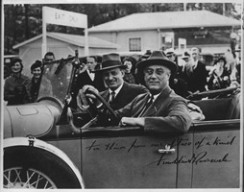
It was highly improbable that the life paths of Franklin D. Roosevelt, Henry Morgenthau, Jr. and William I. Myers would have converged in 1933 to complete the building of the cooperative Farm Credit System that was begun by the original “founding fathers” nearly 20 years earlier. Of course much of history consists of highly unlikely events that changed the course of human affairs. And, this is definitely true of our Farm Credit history.
Roosevelt, Morgenthau and Myers were all from New York State. That’s about all they had in common.
Roosevelt was from an “old money” blueblood family. Morgenthau was the second generation of a German-Jewish family. Myers was from a “middling sorts” rural heritage in the Hudson Valley and Pennsylvania. Roosevelt and Morgenthau had started life in New York City, while Myers was born in the rural hamlet of Lowman in New York’s Southern Tier.
Roosevelt was a lawyer by training, but had spent most of his adult life in politics. Morgenthau had tried his hand at a variety of things including farming, managing his father’s business affairs, publishing a farm magazine and then becoming one of Roosevelt’s most trusted advisors for nearly two decades. Myers had studied agricultural economics, eventually earning a Ph.D. at Cornell University and becoming a professor of farm finance on its faculty. Roosevelt and Morgenthau were from the city, while Myers was decidedly upstate in a state where these regional differences are profound. Roosevelt and Morgenthau were, of course, Democrats. Myers was a Republican.
Roosevelt and Morgenthau met in 1913 and became good friends. They were neighbors in Dutchess County – Roosevelt at Hyde Park and Morgenthau at Fishkill. Both shared an interest in farming and Democratic Party politics. While both Myers and Morgenthau were students at Cornell as young men, there is no record of their becoming acquainted then. After Roosevelt was elected Governor of New York State in 1928, however, the three men began to directly collaborate.
Roosevelt and Morgenthau were quick to reach out for advice from Professor George F. Warren, the head of the ag economics department at Cornell, Myers and others in their department. Through Morgenthau’s ownership and being publisher of the American Agriculturist after 1922, however, it is likely that he would have at least become familiar with Myers’ work, if not having met him some time before 1928.
Roosevelt was elected President on November 8, 1932. America was besieged:
- Since 1929 the Great Depression had deepened, despite the Hoover Administration’s turnaround efforts.
- The banking system was in shambles, with hundreds of banks already having failed.
- The farm sector had been depressed since 1920, defying all efforts to revive it.
Even before Roosevelt won election, Myers was working on a plan. It would not only deal with the current problems in farm finance, but it would build a permanent Farm Credit System to provide all of the credit needs of farmers and their cooperatives. The System would be built on cooperative principles with full ownership by farmers as a future goal. It would lend money based on both safety and soundness. It was intended to enable America’s successful farmers to own their own lending System so that they would not need to rely on direct lending by the government.
Myers presented his plan to Morgenthau in December 1932, who in turn shared it with Roosevelt. It was a go and became a key element of Roosevelt’s agenda for rescuing American agriculture. While some of the details would be refined in the coming months, Myers’ basic framework was readily embraced by the President-Elect and was put into law.
From today’s perspective in which the wheels of our Federal government turn very slowly, it is amazing what was accomplished in a relatively short time – and how incredibly well it has stood the test of time.
March 4, 1933 – Roosevelt is inaugurated. Shortly thereafter, Morgenthau is appointed to head the Federal Farm Board. Myers is an advisor to Morgenthau at this point, on leave from his professorship at Cornell.
March 27, 1933 – Roosevelt issues an executive order reorganizing all farm lending programs into a new agency named the Farm Credit Administration. Congress has 61 days to overturn this Order before it becomes operational
May 12, 1933 – The Emergency Farm Mortgage Act is passed by Congress and signed into law by Roosevelt. The Federal Land Banks are given the daunting assignment of leading the rescue effort for farm mortgage lending – more on that in a future post.
May 27, 1933 – The Farm Credit Administration, with no objection from Congress, comes into operation with Morgenthau as its first Governor and Myers as Deputy Governor.
June 16, 1933 – The Farm Credit Act of 1933 is passed. This was detailed in our last post.
November 17, 1933 – Morgenthau is appointed Deputy Secretary of the Treasury. Myers is appointed as FCA’s second Governor.
January 1, 1934 – Morgenthau is appointed Secretary of the Treasury.
Next: Henry Morgenthau, Jr. – Part I
Photo: Franklin D. Roosevelt and Henry Morgenthau, Jr., 1934.
– See more at: http://www.farmcreditnetwork.com/newsroom/blog/article/the-unlikely-team-of-farm-credit-architects#sthash.fHf7m4hO.dpuf
BLUE JACKETS, GOLD LIGHTS
Even though I have been out of school for a couple of years, I have not forgotten the organization that helped start my journey in the agricultural industry.
Tuesday night of the VA State FFA Convention, I was given the opportunity to participate in the pre-session. As I stood on the same stage where my team won the State FFA Livestock Judging Contest in 2009, where I received my State FFA Degree in 2011, and where I was announced the VA State Poultry Production Proficiency winner in 2012, I was mesmerized by the sea of blue jackets and the reflection of gold lights. I can only hope that I’ve left a lasting impression on one of those students during my time as an FFA member, as so many FFA members left on me.
It all started my 7th grade year when I attended the 80th VA State FFA Convention. Between judging cattle and proudly marching across the drill field in my blue corduroy jacket to Burrus Hall, I made my decision to become a Hokie. Virginia Tech is where my dedication to agriculture began and it is where I hope my dedication will grow into a life-long career. After interning with Farm Credit of the Virginias for two consecutive summers, I am so thankful that my roots are buried deep in agriculture. This internship has allowed me to share my passion for agriculture with an organization that, similar to FFA, strives to bring out the best in its members. Farm Credit works hard to do what is best for its customers even providing them with a patronage refund. Farm Credit has proven to be a successful organization that is committed to helping their members be successful even in volatile economic times. Just the same, FFA provides its members with countless opportunities to travel the country, possess leadership skills and network to build relationships that will last a lifetime.
Needless to say, I would not be where I am today if it weren’t for industry we serve, FFA and Farm Credit. Thank you, Virginia FFA and Farm Credit of the Virginias for allowing me to continue advocating for this incredible industry.
Cheyenne will be a senior this year at Virginia Tech where she is majoring in Agribusiness Management and minoring in Animal and Poultry Sciences.
Pictured is Burrus Hall, the site of all Virginia FFA State Convention Sessions. 
Learning and Laughing
Over the next few weeks we will be highlighting our 2013 summer interns as they share stories and anecdotes about their experiences in the “field”. Please join us in welcoming them to the Farm Credit team.
By: Tiffany Wayland, Summer Intern, Farm Credit of the Virginias.
I have heard students talk about how excited they were for their summer internship only to hear that they were stuck in a tiny cubical to complete their project that no one would ever appreciate. They rarely interact with employees or get to do anything outside of their project. This was my biggest fear, not just as an intern, but in a career I will have to choose once I graduate from college. Luckily, I have been blessed with the opportunity to intern at Farm Credit of the Virginias this summer and I can honestly say those fears have been put to rest.
I have been given the chance to complete a project that allows me to contribute to the association, but it doesn’t tie me down to my desk. I get the privilege of traveling, meeting people, and learning more about the Association. Just last week I attended the AgFirst Intern and New Hire Training in Columbia, SC where I met interns from several Associations within the AgFirst District.
The facilitator, Ronnie Hucks, was able to explain why Farm Credit is so unique and how each Association varies based on several different factors. In addition, learning more about the decisions loan officers make every day and about credit provided me with a better understanding of how Farm Credit works. We were given a mock loan to analyze and then asked to determine whether or not we would loan money to that potential customer. Learning about the patronage refunds was interesting and it reinforced my thoughts about working for such a remarkable Association. I don’t think I could have interned anywhere else this summer and learned as much as I have in the month that I have been here.
Taking on this internship has reinforced something a professor once told me when looking for a career. He told us to make sure that you can contribute, that you can learn and that you can have fun. I have found those three things through Farm Credit and more.
Tiffany, of Sperryville, VA, is a junior at Virginia Tech where she is majoring in Agribusiness Management.
Pictured in front of the AgFirst building are the 2013 Farm Credit of the Virginias first year summer interns (from left to right) are Michelle Biser, Maria Martinez, Tiffany Wayland and Megan Virts.
Local Lender Shares Millions with Rural Community
Farm Credit Returns Significant Portion of Its Profits as Patronage Refund to
Farmers and Rural Residents
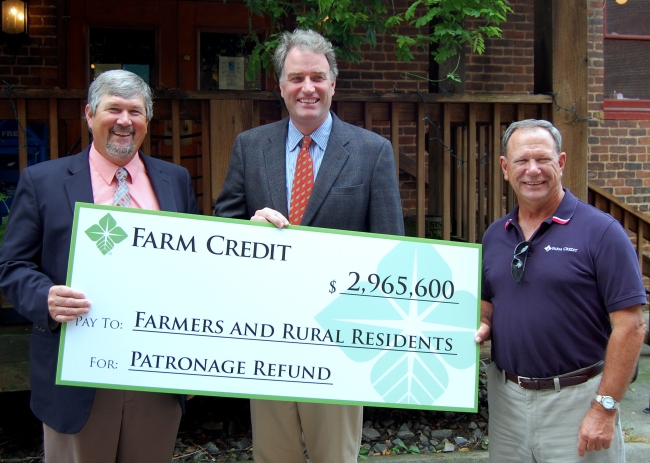 Congressman Robert Hurt (center) met recently with Farm Credit directors Don Reese (L) and John Brickford (R) to help announce the amount of the patronage returned by Farm Credit in Virginia’s 5th District.
Congressman Robert Hurt (center) met recently with Farm Credit directors Don Reese (L) and John Brickford (R) to help announce the amount of the patronage returned by Farm Credit in Virginia’s 5th District.
Congressman Robert Hurt of Virginia’s Fifth District recently met with Farm Credit directors and local farmers as they announced the distribution of a $2,965,600 patronage refund to customers in his district. Agricultural lender Farm Credit is distributing more than $15.7 million in patronage refunds to their member/borrowers in Virginia. Dave Lawrence, president and CEO of Farm Credit of the Virginias, noted that “Farm Credit’s strong financial position has allowed the association to return a portion of our earnings to our customers annually for over a decade. Additionally, as our cost of funds has declined, we have been able to restructure loans to offer better interest rates to our customers.”
Farm Credit of the Virginias, Colonial Farm Credit, and MidAtlantic Farm Credit operate under a cooperative structure, which enables them to give back a portion of their income to customers as a patronage refund. Being in a fortunate position, even during the recent adverse economic periods, they have consistently paid patronage for more than a decade.
“The patronage refund to our association’s customers is important to the employees at Farm Credit. They work diligently to maximize the dollar amount that the association can return to the farmers and rural residents who use its services,” said Don Reese, who is a member of the association’s Board of Directors. “They believe in the mission of being the agricultural lender by which others are judged.”
Farm Credit of the Virginias Accepting Applications for 2013-2014 Ag Biz Planner
Farm Credit of the Virginias is currently accepting applications for the third consecutive class to participate in the Ag Biz Planner offered through Farm Credit University. The Ag Biz Planner includes financial planning, budgeting and other record keeping practices essential to the success of farming or owning an agricultural business.
Through Farm Credit University, Farm Credit of the Virginias is partnering with the Farm Credit Associations in Virginia and North Carolina to conduct the on-line program. Ag Biz Planner participants will have the opportunity to network with a variety of producers throughout the associations involved with the program during the course and at the conclusion conference held in Raleigh, N.C.
Farm Credit strives to assist young, beginning, small, and minority farmers through knowledge of the marketplace, financial, and business management topics. Alongside the online course highlighting these imperative topics, each participant is paired with a loan officer in their area to provide them with mentorship and guidance throughout the program. At the conclusion of the Ag Biz Planner Program, the participant will have compiled a complete business plan for their agricultural operation.
Farm Credit of the Virginias will be accepting up to seven participants for the 2013-2014 Ag Biz Planner class. A participant can be an individual or a couple that has attended the Young Farmer’s Institute, is under the age of 35 and has access to high speed internet. The program will begin in September 2013 and run through March 2014. Applications, a course outline, a list of frequently asked questions, and other program materials are available upon request. Applications for the program will be accepted through August 1, 2013. Individuals that have been accepted to participate in the program will be notified by August 15, 2013. The program will conclude in Raleigh, N.C. on March 13-14, 2014 for a group conference involving all of the participating associations.
Upon acceptance into the program each participant will be asked to pay the tuition cost of $500. In December your progress will be evaluated and participants will be eligible for a $250 tuition reimbursement. Following the completion of the course and a successful business plan the remaining $250 in tuition cost will be reimbursed. In addition to the tuition reimbursement, participants may be eligible for up to $200 in expense reimbursement over the course of the program.
Contact Information:
John Day – Director of Lending Initiatives for Farm Credit JDay@FCVirginias.com 540.347.3344 / 800.559.1016 Ext. 8
Kyley Clevenger – Knowledge Center Specialist for Farm Credit KClevenger@FCVirginias.com 703.777.3311 / 800.559.1016 Ext.4

